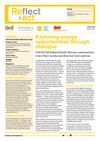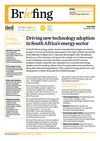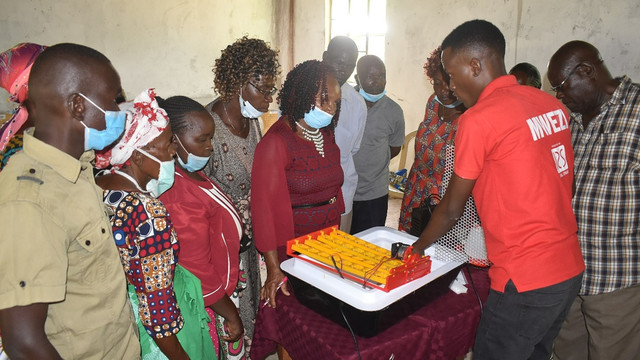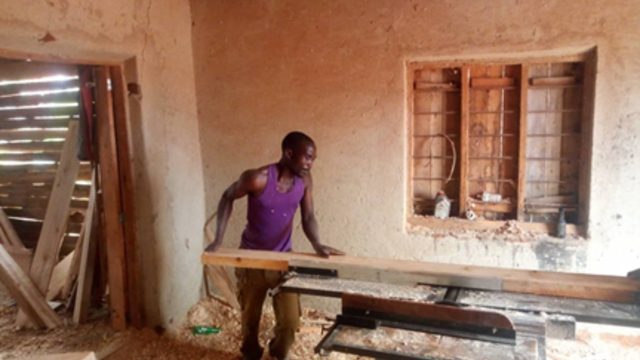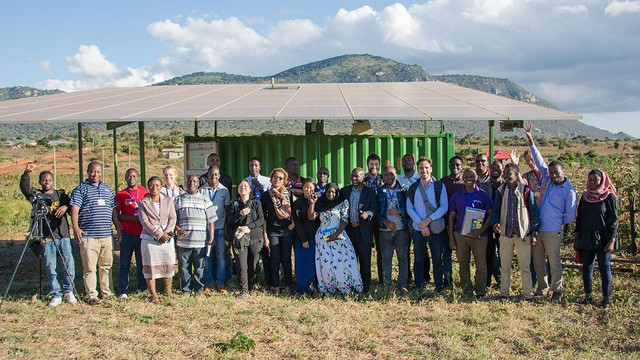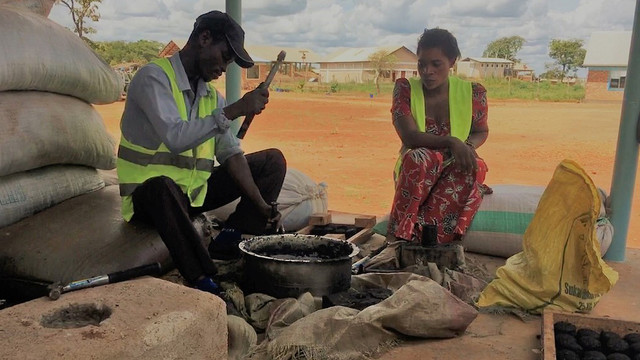CHOICES: community energy in South Africa
IIED and OneWorld brought local communities in South Africa closer to energy planning processes by exploring the feasibility of community-participation models for delivering rural energy services to communities without electricity in the Eastern Cape.

The CHOICES project team (Photo: OneWorld)
The CHOICES (Community and Household Options In Choosing Energy Services) project in South Africa's Eastern Cape sought to enable communities to make sustainable energy choices that reduced energy poverty and stimulated local development.
Funded by the Renewable Energy and Energy Efficiency Partnership (REEEP), the project focused on building local people's capacity to participate in identifying and exploring locally appropriate energy options with greater community benefits. It aimed to develop:
- Knowledge of what local alternative energy resources are available
- A better understanding of how the community is using energy and how they could use energy more efficiently, and
- The community’s business skills so they can collaborate with investors and developers who share their green energy vision in future.
The project was embedded in the belief that a green economy needs to be rooted at a rural level and include poor communities if it is to create social change. Therefore, green economy thinking must consider local contexts and be relevant to the citizens it aims to serve: incorporating their perspectives, needs and aspirations, such as their need for jobs.
CHOICES was designed to complement the efforts of the South Africa government, and enable greater community involvement in the implementation of sustainable energy policies.
Greater access to on-grid and off-grid electrification had been pursued in South Africa since the mid-1990s to foster socio-economic development and poverty reduction. Success has been hampered by the unreliability and low capacity of off-grid initiatives, a dilapidated, overstretched coal-based grid network and a lack of effective payment systems for poor users. But previous interventions lacked the meaningful involvement of local communities meant to benefit from the scheme.
South Africa's Green Economy Accord of 2011 and various economic development policies recognised the importance of job creation and market-based opportunities. In addition, the Department of Energy had a target to ensure that all households had energy access by 2025, including renewable energy.
What did IIED do?
The project was led locally by South Africa-based organisation OneWorld, supported by research, communications and project management support from IIED, as well as additional expert contributions from The Energy and Resources Institute (TERI, India).
In order to follow the CHOICES approach and work closely with communities, a local steering committee was set up first. A series of capacity-building workshops, which included local community members, were then organised to build understanding of energy access issues and opportunities – including examples of business models. Participants were then encouraged to identify and prioritise energy access options for their community.
A video showing community workshops take place in August 2014
This was supported by participatory energy access surveys at community and household level. The aim was to unpick a portfolio of energy investment options with community buy-in as a way to reduce investor risks, thus attracting appropriate investment partners.
I now know enough to engage the renewable energy space with confidence, thanks to the CHOICES-SA Project. The project has assisted me to execute my mandate on this subject with authority. Additionally, my constituency is equally empowered to support me and hold me to account – MK Mali, ward councillor and project steering committee chair
The South Africa government provided policy support for independent power providers that stimulated investment in the renewable energy sector and community development projects.
CHOICES also stimulated investor-community dialogue via expert meetings and engagement. For investors, under-developed communities represented 'base-of-the-pyramid' markets with huge growth potential, but these markets were high-risk with long-term/low return investment prospects.
Small-scale innovations that worked at the community level showed potential for broader adoption, but this will take time and proof of concept. Through research, training and awareness-raising, these innovations could be scaled up and replicated for higher impact.
Investors needed to understand markets better, while government and donors needed to understand ways of stimulating these markets. One way to improve understanding was through detailed case study analysis and effective dissemination of findings in a language that investors, governments and donors would all understand.
Looking forward
OneWorld and IIED sought funding to work with the Blue Crane Route Municipality to develop a business plan as a foundation for further engagement between community leaders, the Blue Crane Development Agency and potential public and private sector investors. This included the Eastern Cape provincial government, which showed interest in replicating the CHOICES approach across the Eastern Cape.
IIED documented the lessons from the first phase of CHOICES and used the experience in other projects such as work to ensure sustainable energy access in Nigeria and inclusive energy planning.
We also developed approaches for enhanced community involvement in decision-making and implementation of energy access projects. The dialogues in South Africa had much to say about why local participation is important and how it can encourage investment in sustainable energy access for low-income communities.
Publications
Additional resources
South Africa: a case for biomass?, Belynda Petrie (2014), IIED report
Green jobs: access to clean energy can create employment in South Africa, Belynda Petrie (2013), IIED briefing
South African biomass energy: little heeded but much needed, Belynda Petrie, Duncan Macqueen (2013), IIED briefing
Making communities count: maximising local benefit potential in South Africa's Renewable Energy Independent Power Producer Procurement Programme (RE IPPPP), Louise Tait, Holle Linnea Wlokas, Ben Garside (2013), IIED report
News: Neglected energy source can fuel giant leap forward in developing nations (2011)
Partners
The Energy and Resources Institute (TERI, India)
Blue Crane Development Agency
